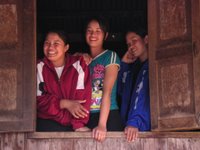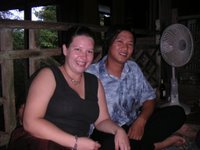Saturday, August 05, 2006
The Scramble Before Harvest
I'm back in L aos for a quick ten day review of the program's progress and, as always, I welcome the immediate relaxation that I feel on arrival. You just can't get stressed in this country! The rainy season is in full swing: lowland farmers are planting rice seedlings in knee deep water in the paddies, and the highland coffee farmers are relaxing and waiting for the sun to return to ripen the coffee cherries.
aos for a quick ten day review of the program's progress and, as always, I welcome the immediate relaxation that I feel on arrival. You just can't get stressed in this country! The rainy season is in full swing: lowland farmers are planting rice seedlings in knee deep water in the paddies, and the highland coffee farmers are relaxing and waiting for the sun to return to ripen the coffee cherries.
Harvest will be early this year and yields should be excellent. Ariya, Emma, Sin, the JCFC President Noumalla and I had dinner with the district governor on Friday night and he said his own Robusta harvest dropped 90% last year because of late rains and hail. Needless to say, the farmers are excited about a healthy crop this year.
The JCFC staff has been hard at work on the coming changes to the co-op's business. We will be working much more closely with the French development agency, AFD, as they implement new village processing stations in most of our villages. AFD has set up village funds on most of the plateau to provide loans for the farmers to purchase equipment. Our part of the partnership is to provide processing training and supervision in JCFC villages during the harvest to ensure quality, and market the production to Fair Trade roasters like Thanksgiving Coffee.
In the past, our centralized processing station limited our production capacity and the farmers involvement in their own co-op. With this new system, the farmers process their own coffee and maintain ownership until the coffee needs to be dry processed for export. It will also lower the co-op's operating costs, get the farmers much more involved and simplify the staff activities.

The staff can then separate coffee from all member villages and identify the best crop, processing technique and coffee care through cupping the beans. The village that produces the best coffee may be able to get a premium above the Fair Trade price and we can identify and help those villages with greater disease problems or poor processing technique. As the volunteers that support the development of the JCFC have limited funds, this arrangement is a blessing for the co-op. We are excited at the chance to grow JCFC production more quickly than expected.
With the help of our financing partner, Rabobank, the JCFC is also starting a new pre-harvest lending program. Many of our farmers run out of money towards the end of the rainy season. There is little food ready to eat from home gardens so this is known as the hungry season. The farmers will then have to pre-sell their coffee while still on the tree to local traders at half price. Rabobank has agreed to offer harvest finance a few months early, allowing the JCFC to give our farmers money at a competitive rate and still receive full price for their coffee. This year we will offer the funds in the middle of August and next year we plan to start as early as the first of July.
Finally, we are working with coffee industry consultants to land a grant from New Zealand Aid to develop a market for the washed robusta from the plateau. The application has made it through the first stage of the review process and the consultants will be in Laos in October to finalize prepar ations for the last round of review. The robusta from the plateau is one of the few in the world grown at a high elevation. The washed process adds a further step in making this one of the smoothest and cleanest tasting robustas in the world. Robusta represents over 70% of the coffee farmed in Laos, and the farmers will appreciate higher prices for this special product.
ations for the last round of review. The robusta from the plateau is one of the few in the world grown at a high elevation. The washed process adds a further step in making this one of the smoothest and cleanest tasting robustas in the world. Robusta represents over 70% of the coffee farmed in Laos, and the farmers will appreciate higher prices for this special product.
I had the pleasure this weekend of attending the engagement ceremony for Emma. We conducted very complicated negotiations over a few cases of beer lao and were able to secure two buffalos (a pregnant female and a bull), one ounce of gold and $300 for the bride to be. She is now engaged to Sin, a fine man from a coffee and tea farming family. Sok Dii!
 aos for a quick ten day review of the program's progress and, as always, I welcome the immediate relaxation that I feel on arrival. You just can't get stressed in this country! The rainy season is in full swing: lowland farmers are planting rice seedlings in knee deep water in the paddies, and the highland coffee farmers are relaxing and waiting for the sun to return to ripen the coffee cherries.
aos for a quick ten day review of the program's progress and, as always, I welcome the immediate relaxation that I feel on arrival. You just can't get stressed in this country! The rainy season is in full swing: lowland farmers are planting rice seedlings in knee deep water in the paddies, and the highland coffee farmers are relaxing and waiting for the sun to return to ripen the coffee cherries.Harvest will be early this year and yields should be excellent. Ariya, Emma, Sin, the JCFC President Noumalla and I had dinner with the district governor on Friday night and he said his own Robusta harvest dropped 90% last year because of late rains and hail. Needless to say, the farmers are excited about a healthy crop this year.
The JCFC staff has been hard at work on the coming changes to the co-op's business. We will be working much more closely with the French development agency, AFD, as they implement new village processing stations in most of our villages. AFD has set up village funds on most of the plateau to provide loans for the farmers to purchase equipment. Our part of the partnership is to provide processing training and supervision in JCFC villages during the harvest to ensure quality, and market the production to Fair Trade roasters like Thanksgiving Coffee.
In the past, our centralized processing station limited our production capacity and the farmers involvement in their own co-op. With this new system, the farmers process their own coffee and maintain ownership until the coffee needs to be dry processed for export. It will also lower the co-op's operating costs, get the farmers much more involved and simplify the staff activities.

The staff can then separate coffee from all member villages and identify the best crop, processing technique and coffee care through cupping the beans. The village that produces the best coffee may be able to get a premium above the Fair Trade price and we can identify and help those villages with greater disease problems or poor processing technique. As the volunteers that support the development of the JCFC have limited funds, this arrangement is a blessing for the co-op. We are excited at the chance to grow JCFC production more quickly than expected.
With the help of our financing partner, Rabobank, the JCFC is also starting a new pre-harvest lending program. Many of our farmers run out of money towards the end of the rainy season. There is little food ready to eat from home gardens so this is known as the hungry season. The farmers will then have to pre-sell their coffee while still on the tree to local traders at half price. Rabobank has agreed to offer harvest finance a few months early, allowing the JCFC to give our farmers money at a competitive rate and still receive full price for their coffee. This year we will offer the funds in the middle of August and next year we plan to start as early as the first of July.
Finally, we are working with coffee industry consultants to land a grant from New Zealand Aid to develop a market for the washed robusta from the plateau. The application has made it through the first stage of the review process and the consultants will be in Laos in October to finalize prepar
 ations for the last round of review. The robusta from the plateau is one of the few in the world grown at a high elevation. The washed process adds a further step in making this one of the smoothest and cleanest tasting robustas in the world. Robusta represents over 70% of the coffee farmed in Laos, and the farmers will appreciate higher prices for this special product.
ations for the last round of review. The robusta from the plateau is one of the few in the world grown at a high elevation. The washed process adds a further step in making this one of the smoothest and cleanest tasting robustas in the world. Robusta represents over 70% of the coffee farmed in Laos, and the farmers will appreciate higher prices for this special product.I had the pleasure this weekend of attending the engagement ceremony for Emma. We conducted very complicated negotiations over a few cases of beer lao and were able to secure two buffalos (a pregnant female and a bull), one ounce of gold and $300 for the bride to be. She is now engaged to Sin, a fine man from a coffee and tea farming family. Sok Dii!
